November 25, 2025 | 05:51 GMT +7
November 25, 2025 | 05:51 GMT +7
Hotline: 0913.378.918
November 25, 2025 | 05:51 GMT +7
Hotline: 0913.378.918
Tea cultivation has been developed in Vietnam for hundreds of years, playing a crucial role in economic development and social security, especially in the midland and mountainous areas where people’s livelihoods still face many difficulties and depend on agricultural production.
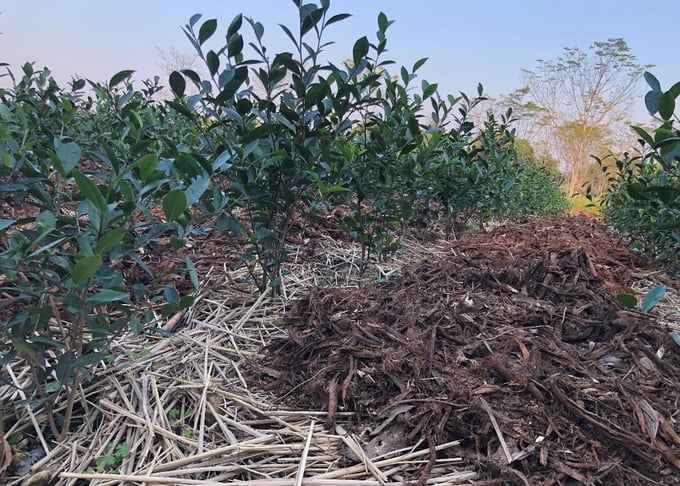
Covering tea soil with agricultural by-products (straw, acacia bark, eucalyptus, eucalyptus, etc.) combined with decaying organic fertilizers helps to improve soil fertility, limit weeds and reduce chemical fertilizer requirements (photo taken in Tan Cuong, Thai Nguyen). Photo: Pham Hieu.
According to MARD, Vietnam has nearly 123,000 hectares of tea, mainly grown in the northern mountainous provinces and partly in Lam Dong province. Annually, tea production chains have an export value of over 200 million USD, creating millions of jobs for people in rural and mountainous areas.
Tea is a rather special crop compared to others. Each year, tea leaves are harvested 7-8 times, mainly to process for drinking. Currently, according to the popular conventional farming method, before each harvest, in order to ensure productivity and limit pest damage, tea plants are often sprayed or applied with a lot of fertilizers, and chemical pesticides of various kinds.
Many farmers calculate preliminarily that every year, each tea field has to bear dozens of times spraying pesticides and fertilizing. The situation has a huge and long-term impact on the health of tea farmers, consumers, as well as the ecosystem (soil, water, and biological species.
In recent years, the living standards of Vietnamese people have increasingly improved, and consumers have paid more attention to the origin and quality of food. The rising trend of green and clean consumption has opened up opportunities for organic, safe, and clearly sourced products.
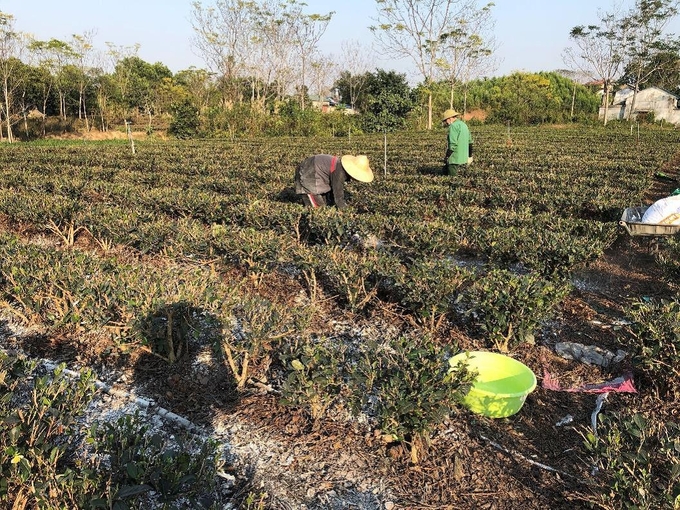
Fertilization with appropriate dosage helps to minimize acidification of tea soil and improve soil fertility as well as the yield and quality of tea plants. Photo: Pham Hieu.
Understanding consumers’ demand, more farmers are encouraged to apply organic and ecological tea farming methods to improve product quality, thereby increasing value and production income. At the same time, the method limits the negative effects of conventional farming methods on the environment and public health.
However, so far, the sustainability and effectiveness of these models have not been paid enough attention and research, and there are no scientific fundamentals to serve the expansion of the method as well as policy making.
Since 2019, under the support and coordination between Deakin University (Australia), the International Union for Biodiversity and Tropical Agriculture (Alliance Biodiversity & CIAT), the Center for International Cooperation on Research Agriculture for Development (CIRAD – France), the Microbiological Biotechnology Network (CMBP) and the Northern Mountainous Agro-Forestry Science and Technology Institute (NOMAFSI), a team of graduate students including Le Viet San (Deakin University) and experts from the above units have conducted research and evaluation. They point out the limitations, negative and long-term impacts of conventional tea cultivation, which mainly uses chemicals such as fertilizers, pesticides, herbicides, etc. This method causes degradation of the soil (chemical, physical and biological impact), especially rapid acidification of tea soil. Overall, it reduces the diversity and function of soil organisms as well as the yield and quality of tea plants, causing many risks to the environment and public health.
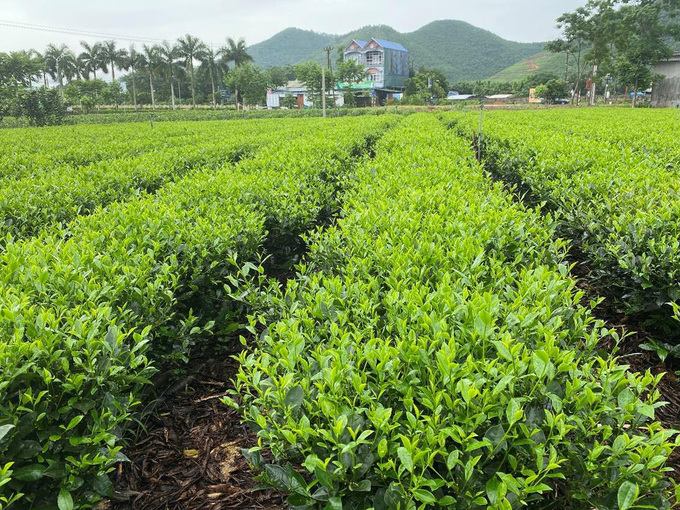
Tea farmers are applying organic farming methods in Tan Cuong (Thai Nguyen) to prepare for harvesting. Photo: Pham Hieu.
Based on the research outcomes, the experts recommend several effective and sustainable tea farming methods that can gradually replace conventional farming. This new approach to organic and ecological farming, measuring biological products to limit the acidification of tea soil, gradually restoring the soil health and improving productivity, quality, and efficiency of tea production in Vietnam.
Comparing organic and ecological farming models to conventional farming models in Tan Cuong (Thai Nguyen), the research team has shown that households/cooperatives applying organic/ecological models can earn 180-200 million VND per hectare more than farmers applying conventional farming methods.
This difference is mainly due to the higher selling price of organic/ecological products compared to conventional products. At the same time, farmers and cooperatives that apply safe and sustainable farming methods also have more potential to access preferential loans, and support programs from local and international agencies.
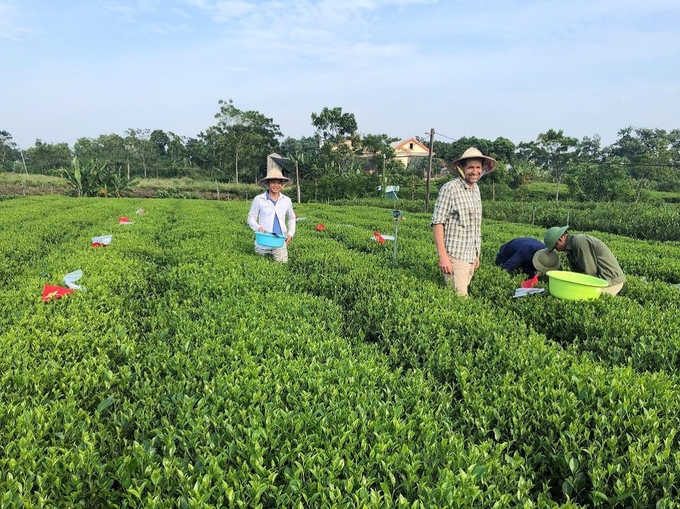
The research team conduct the assessment and collected samples in the field. Photo: Pham Hieu.
In addition, organic tea farming methods help maintain and improve the soil quality and use, cultivating better tea buds as well as minimizing negative impacts on the environment. Reducing the residues of pesticides and heavy metals in soil, water, and tea products protects the health of producers and consumers.
To solve the acidification of tea soil, using powdered lime with an appropriate amount of fertilizer will contribute to quickly improving soil pH, thereby improving soil fertility. For example, when the soil pH is at 4–4.5, applying lime powder with an amount of 1.5 tons per hectare can help increase the soil pH (reduce acidity) by about 0.4–0.5 units. This technique improves the environment for soil organisms to grow, reduces the risk of poisoning with heavy metals such as aluminum, and manganese, and enhances the ability to balance nutrients of the soil.
These research outcomes have been published in prominent international scientific journals and conferences such as Environmental Chemistry Letters, Soil Use and Management, Environmental Sustainability, International Phytobiomes Conference (USA 2022), 13th International Conference on Agrophysics (Poland, 2021), and in domestic magazines.
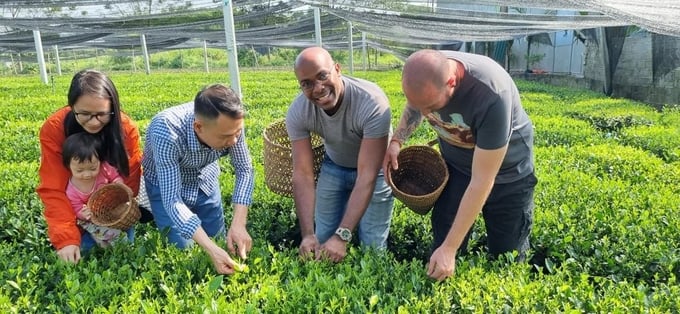
Community-based tourism activities to experience tea picking at Tan Cuong Tea Cooperative (Thai Nguyen). Photo: Pham Hieu.
In addition, the application of eco-friendly, organic production also creates opportunities to develop community-based experiences and tourism activities, thereby contributing to the promotion of this farming model as well as benefiting tea producers.
The results above can be very useful and timely references for agencies and producers choosing an orientation that is suitable and sustainable with the conditions of the family and locality, which helps to meet the increasing requirements of the market, and income from agricultural production, while also protecting the health of producers and consumers for tea and other agricultural crops, aiming for more green and sustainable agriculture.
Translated by Quynh Chi

(VAN) Green transition is crucial for the Mekong Delta amid climate change and stricter standards, offering a path toward sustainability.

(VAN) Dong Thap promotes agricultural restructuring, forms large specialized farming zones, raises the value of agricultural products and develops toward ecological and high-tech directions.
/2025/11/22/4018-4-213342_747.jpg)
(VAN) The Mekong Delta Agricultural Experts Club has attracted 143 experts and researchers to participate in providing consultancy and contributing initiatives to the development of one million hectares of high-quality rice.

(VAN) Ca Mau’s development of OCOP products opens a path to increasing cooperatives value, helping boost income, expand markets, and affirm collective economy's role.

(VAN) Turning seemingly ordinary coconut shells into unique jewelry and artwork, Nguyen Bang Nhi spreads the value of local culture through her brand, Cocohand.

(VAN) Results from the Sustainable Durian Model Project in Dak Lak have confirmed the critical role of Yara Viet Nam in transferring advanced nutritional solutions to farmers.

(VAN) In Tuyen Quang province, livestock farmers have introduced effective models and innovative practices that significantly strengthen African Swine Fever prevention and control efforts.